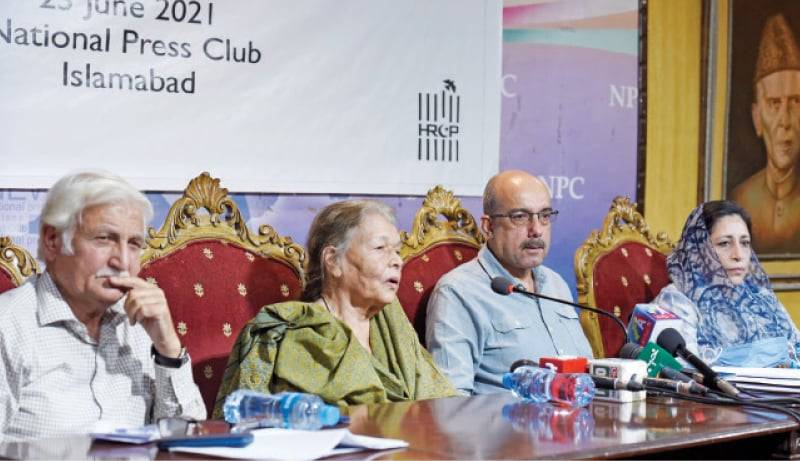
The human rights record of Pakistan has never been commendable, but 2020 showed some new negative trends. This is evident from a reading of the annual report for 2020 painstakingly prepared by the independent Human Rights Commission of Pakistan (HRCP) founded by late Asma Jahangir. Last Wednesday, provincial chapters of the HRCP launched reports pertaining to the human rights situation in their respective provinces.
The chapter pertaining to the federal capital territory was launched before the media at the National Press Club by the Islamabad chapter coordinator, the tireless human rights defender Nasreen Azhar.
This chapter is a disturbing reading and needs to be recalled briefly. The human rights situation and the legislative and executive decisions taken in the federal capital is not only the trendsetter, but should also give a fair idea of the state of human rights in remote areas of the country. The national human rights institutions rooted in the country’s constitution and legal system collapsed during the year. The statutory National Commission on Human Rights (NCHR) has been dysfunctional since May 2019. Due to the collapse of this platform, citizens have nowhere to complain about violations of their human rights.
The National Commission on the Status of Women (NCSW), another constitutional body meant to address issues relating to women, remains without a chairperson since November 2019. The doors for women seeking redressal of grievances have also thus been closed.
The AJK Assembly constituted a commission to document the human rights situation in the region. The commission has still not been put in place.
Freedom of expression remained under serious threat. The government did not heed protest demonstrations held against new curbs on print, electronic and social media and on media professionals. The owner of the largest media group was put behind bars in a 35-year-old case by the NAB.
FIRs were registered against Asad Toor over ‘negative propaganda.’ Journalist Ahmad Noorani alleged that he was receiving threats for his investigative report on the businesses of the serving head of the CPEC Authority.
Provision of the Pakistan Electronic Crimes Act 2016 continued to be misused and FIA did not submit its bi-annual report before the parliament.
Worryingly, enforced disappearances continued even in the federal capital. At least three cases of enforced disappearance had been reported in the federal capital during 2020.

Well known defense lawyer for missing persons, Lt Col (R) Inamur Rahiem, journalist Matiullah Jan and a senior officer of the Security Exchange Commission of Pakistan (SECP) were kidnapped in broad daylight in the federal capital.
Since its inception in 2011, the Commission on Involuntary and Enforced Disappearances (COIED) received 300 cases from Islamabad capital territory, 17 of which were traced to internment centers. It only confirms the fears that these centers had become Guantanamo Bay-like prisons, where some of the disappeared were dumped, if they were fortunate to escape being killed extrajudicially.
As many as 28 disappeared were traced to prisons but it remained unclear whether they had been sent to jail only after alarms were raised over their disappearances. Eight bodies were found. In all, the commission had traced 197 persons from ICT as of end-2020.
The commission was unable to fix responsibility one a single case, let alone prosecute any criminal involved in these disappearances.
As a result, the commission received a scathing review from international bodies like the ICJ for failing to address the entrenched impunity of the crime and leaving victims and their loved ones without any redress.
The ICJ recommended that the mandate of the commission not be extended because of its abysmal failure in fixing responsibility on individuals or organizations. Instead of heeding this advice, the government rebuffed the recommendation and extended the mandate of the chairman, Justice (R) Javed Iqbal, by another three years.
Female journalists came under vicious attacks, forcing them to issue a joint petition seeking protection. The UN office of human rights voiced concern and called upon the government to take “immediate and concrete” steps to ensure their protection but no action was taken.
PEMRA imposed a ban on airing speeches by ‘absconders.’ This action is viewed by many as aimed at preventing the telecasting of former prime minister Nawaz Sharif.
Digital rights came under attack when in November last year, the IT ministry notified ‘Removal of Unlawful Online Content Rules’ without consultation with stakeholders in what is largely viewed as an assault on digital rights of the people.
The government continued to issue one presidential ordinance after another, bypassing constitutional procedures of presenting draft bills in the parliament and holding detailed discussions and readings of these drafts.
Freedom of thought, conscience and religion came under attack in the federal capital also. A Commission on Minorities had been set up but it was not independent, as instead of an act of the parliament, it was set up under an executive order and therefore beholden to it.
Far right groups protested the construction of a Hindu temple in Islamabad even after Prime Minister Imran Khan approved a grant of Rs100 million for its construction.
A single national curriculum (SNC) is imposed on the provinces not only in violation of the 18th constitutional amendment, but also militating against the minorities’ right to freely profess their faith. During 2020 they continued to ask as to why a curriculum aimed at promoting faith of the majority was also imposed on them.
The writer has been a member of the human rights committee of the Senate.
The chapter pertaining to the federal capital territory was launched before the media at the National Press Club by the Islamabad chapter coordinator, the tireless human rights defender Nasreen Azhar.
This chapter is a disturbing reading and needs to be recalled briefly. The human rights situation and the legislative and executive decisions taken in the federal capital is not only the trendsetter, but should also give a fair idea of the state of human rights in remote areas of the country. The national human rights institutions rooted in the country’s constitution and legal system collapsed during the year. The statutory National Commission on Human Rights (NCHR) has been dysfunctional since May 2019. Due to the collapse of this platform, citizens have nowhere to complain about violations of their human rights.
The National Commission on the Status of Women (NCSW), another constitutional body meant to address issues relating to women, remains without a chairperson since November 2019. The doors for women seeking redressal of grievances have also thus been closed.
The AJK Assembly constituted a commission to document the human rights situation in the region. The commission has still not been put in place.
Freedom of expression remained under serious threat. The government did not heed protest demonstrations held against new curbs on print, electronic and social media and on media professionals. The owner of the largest media group was put behind bars in a 35-year-old case by the NAB.
The government continued to issue one presidential ordinance after another, bypassing constitutional procedures of presenting draft bills in the parliament and holding detailed discussions
FIRs were registered against Asad Toor over ‘negative propaganda.’ Journalist Ahmad Noorani alleged that he was receiving threats for his investigative report on the businesses of the serving head of the CPEC Authority.
Provision of the Pakistan Electronic Crimes Act 2016 continued to be misused and FIA did not submit its bi-annual report before the parliament.
Worryingly, enforced disappearances continued even in the federal capital. At least three cases of enforced disappearance had been reported in the federal capital during 2020.

Well known defense lawyer for missing persons, Lt Col (R) Inamur Rahiem, journalist Matiullah Jan and a senior officer of the Security Exchange Commission of Pakistan (SECP) were kidnapped in broad daylight in the federal capital.
Since its inception in 2011, the Commission on Involuntary and Enforced Disappearances (COIED) received 300 cases from Islamabad capital territory, 17 of which were traced to internment centers. It only confirms the fears that these centers had become Guantanamo Bay-like prisons, where some of the disappeared were dumped, if they were fortunate to escape being killed extrajudicially.
As many as 28 disappeared were traced to prisons but it remained unclear whether they had been sent to jail only after alarms were raised over their disappearances. Eight bodies were found. In all, the commission had traced 197 persons from ICT as of end-2020.
The commission was unable to fix responsibility one a single case, let alone prosecute any criminal involved in these disappearances.
As a result, the commission received a scathing review from international bodies like the ICJ for failing to address the entrenched impunity of the crime and leaving victims and their loved ones without any redress.
The ICJ recommended that the mandate of the commission not be extended because of its abysmal failure in fixing responsibility on individuals or organizations. Instead of heeding this advice, the government rebuffed the recommendation and extended the mandate of the chairman, Justice (R) Javed Iqbal, by another three years.
Female journalists came under vicious attacks, forcing them to issue a joint petition seeking protection. The UN office of human rights voiced concern and called upon the government to take “immediate and concrete” steps to ensure their protection but no action was taken.
PEMRA imposed a ban on airing speeches by ‘absconders.’ This action is viewed by many as aimed at preventing the telecasting of former prime minister Nawaz Sharif.
Digital rights came under attack when in November last year, the IT ministry notified ‘Removal of Unlawful Online Content Rules’ without consultation with stakeholders in what is largely viewed as an assault on digital rights of the people.
The government continued to issue one presidential ordinance after another, bypassing constitutional procedures of presenting draft bills in the parliament and holding detailed discussions and readings of these drafts.
Freedom of thought, conscience and religion came under attack in the federal capital also. A Commission on Minorities had been set up but it was not independent, as instead of an act of the parliament, it was set up under an executive order and therefore beholden to it.
Far right groups protested the construction of a Hindu temple in Islamabad even after Prime Minister Imran Khan approved a grant of Rs100 million for its construction.
A single national curriculum (SNC) is imposed on the provinces not only in violation of the 18th constitutional amendment, but also militating against the minorities’ right to freely profess their faith. During 2020 they continued to ask as to why a curriculum aimed at promoting faith of the majority was also imposed on them.
The writer has been a member of the human rights committee of the Senate.

